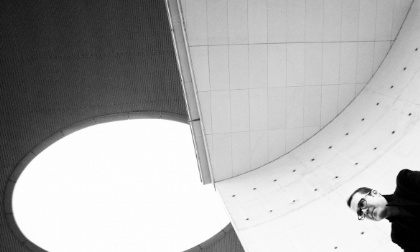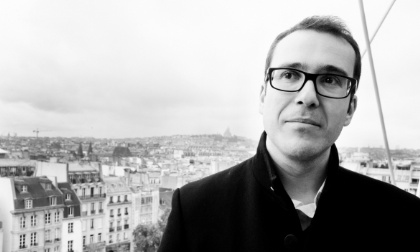|
|
 |
| 01 |
|
Nachtspiegel (2008), 1. Teil |
15:28 |
 |
|
|
 |
|
|
|
| 02 |
|
Nachtspiegel (2008), 2. Teil |
06:10 |
 |
|
|
 |
|
|
|
| 03 |
|
Nachtspiegel (2008), 3. Teil |
05:20 |
 |
|
|
 |
|
|
|
| 04 |
|
Störungen (2011) |
17:13 |
 |
|
|
 |
|
|
|
| 05 |
|
Introduction à Iðavöllr (2013), I. Niflheim |
02:11 |
 |
|
|
 |
|
|
|
| 06 |
|
Introduction à Iðavöllr (2013), II. Muspellheim |
02:19 |
 |
|
|
 |
|
|
|
| 07 |
|
Introduction à Iðavöllr (2013), III. Ginnungagap |
02:19 |
 |
|
|
 |
|
|
|
| 08 |
|
Introduction à Iðavöllr (2013), IV. Ragnarök |
02:27 |
 |
|
|
 |
|
|
|
| 09 |
|
Introduction à Iðavöllr (2013), V. Gimlé |
02:26 |
 |
|
|
 |
|
|
|
| 10 |
|
The forgotten City (2015/2016) |
23:14 |
 |
|
|
 |
|
|
|
 |
|
|
|
|
|
|
|
 mp3 320 kB/s mp3 320 kB/s |
|
 |
|
|
Durchgang |
|
9,99 € | download |
|
 |
|
 |
| David Hudry: Durchgang |
|
Nachtspiegel (2008)
Ensemble Modern conducted by Duncan Ward
1. Part
2. Part
3. Part
Störungen (2011)
ensemble recherche Introduction à Iðavöllr (2013)
Orchestre Philharmonique de Radio France – Mikko Franck, musical director, conducted by Pascal Rophé
I. Niflheim
II. Muspellheim
III. Ginnungagap
IV. Ragnarök
V. Gimlé
The Forgotten City (2015/2016)
Ensemble intercontemporain conducted by Bastien Stil
|
 |
| David Hudry‘s Musical World Visions |
|
 |
|
| © Manu Theobald |
|
When looking at works from a composer’s youth, it is sometimes difficult to locate the point at which the sum of musical particles that evolved like free electrons first crystallized into a stylistic identity. In the case of David Hudry, it is Nachtspiegel (2008) that brings together the achievements of the prece ding works and puts them in a meltingpot; it is here that the composer endeavours to perfect and combine them in a more organic way in order to lend them new force. While this orchestral piece can certainly be considered a forwardlooking work, but also a summation and a recapitulation, it is notable for taking up an idea from its predecessor Räumezeit (2004), which uses a division into four distinct instrumental groups, namely the idea of associating a particular group of intervals with a location in the performance space. In order to make this spatial redistribution more perceptible, the com poser nds a more systematic way to develop classes of chords which are assigned to the different instrumental families according to his preference. This leads to the gradual emergence of a more de ned harmonic logic based primarily on a typology of intervals that follow, in part, considerations of acoustic and organological order. What applies to the harmonic domain applies equally to the shaping of melodic elements, so it is hardly surprising that listening to Nachtspiegel reveals not only striking harmonic elds, but also melodic pro les strongly coloured by particular intervals; these can convey a special tension which, depending on the situation, sometimes takes on the character of an expressionistic lyricism. These melodies are not so much developed as varied, or perhaps elaborated infinitely, to weave the framework of the piece. Echoing Goethian organicism, one here finds thei deal of a musical universe developed from a single seed, though the com poser would soon abandon this ideal. The interweaving of melodic lines suggests growth, or even the proliferation of plants, showing an attachment to a material crafted internally in every tiny detail; despite creating a percepti on of the whole, it clearly resembles a polyphony of objects more than a polyphony of lines. [...]
by Pierre Rigaudière
(Translation: Wieland Hoban)
|
 |
| About: David Hudry |
|
 |
|
| © Manu Theobald |
|
David Hudry is a French composer who is interested in the exploration of dramaturgy using heterogeneous musical characters. Inspired by the graphic arts, especially by Klee and Kandinsky, his music articulates gures and gestures that create tension and lends a visual aspect to the sonic material. He attaches great importance to harmony and its ability to act directly on our senses and emotions; both rigorous and lled with a fully assumed lyricism, his music echoes his personality and shows an inner expressivity favouring con icts and breaks. While at the “Conservatoire de Montpellier”, he also pursued Musi cology at the University Paul Valery (Montpellier) and obtained his Master‘s level teaching certi cation “Agrégation” in musicology in 2002. In 2008, he completed his “Diplôme de Formation Supérieure” (DFS) in Composition and New Technologies with honours (Premiere Prize) at the “Conservatoire National Supérieur de Musique et de Danse de Paris” under the guidance of E. Nunes, S. Gervasoni (composition) and L. Naon (electroacoustics). In 2006, he was selected for the yearlong Ircam program of composition and new technologies. David Hudry was awarded the Meyer Foundation bursary (2006) and the “Pierre Cardin” Prize (Institut de France, Académie des BeauxArts, 2012). [...]
|
 |
| Portrait: David Hudry |
|
|
|
|
A film by Johannes List. |
1CD | Ernst von Siemens Musikstiftung | Contemporary |
|
 |
 |
| Recommendation |
|
|
|
|
For me, composition is a game’, says Kampe, ‘using objects which – from a distance – don’t seem to belong together.  |
 |
|
|
|
|
Ceremonies, too, guard their silences: the music of Christian Mason.  |
 |
|
|
|
|
It seems that Djordjević’s imagination is focussed entirely on an interior world, on the interplay of forces within a de ned space.  |
 |
|
|


